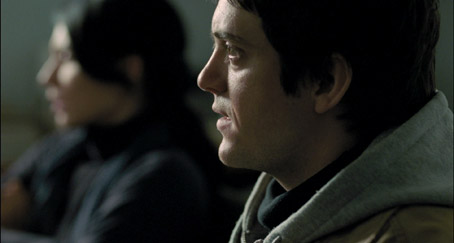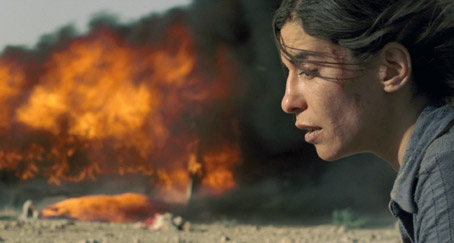"I wanted to do a movie about family, how a family deals with
stress. And anger driving from parents to children, and the
children
have to
get rid of this anger in order to become adults." |
Director Denis Villeneuve
interviewed by Little White Lies |
It's a fact of life that we tend to judge people by the image they project rather than who they really are. Then again, until we really get to know them that's all we've got to go on. And it's only when you really get close to someone that the barriers come down, and the part of themselves that they prefer to keep hidden from public view is unveiled for your personal edification. People the world over go through horrendous experiences and appear to come through with no obvious psychological hurt. But just because you can't see it doesn't mean it's not there. Over the years I've heard personal stories from people I cared for that would make your blood run cold. And yet if you met them at a party you'd think they were the most well adjusted people on the face of the planet and had never had an unhappy day in their life. For them such experiences are best left in the past, and as someone who is carrying his own small set of emotional scars, I can assure you that recalling and discussing them with people who have never been through something similar is not always the therapeutic experience we're led to believe.
It's a concept at the heart of French-Canadian director Denis Villeneuve's extraordinary Incendies (which translates as 'Scorched'). At the will reading of the recently deceased Nawal Marwan, a Canadian citizen of Middle Eastern birth, twin siblings Jeanne and Simon are charged with the task of finding and delivering letters to a father they believed was dead and an unnamed brother they never knew they had. Simon is hostile to the whole idea, but with a little help from the university professor for whom she works, Jeanne travels to an unspecified and civil war-torn Middle Eastern region in search of answers that will unlock the secrets of her mother's past.

There is, of course, a lot more to the story than this simple but intriguing setup may suggest, but I'm reluctant to elaborate further for fear of giving away what deserves to be revealed on director Denis Villeneuve's exquisitely crafted terms. This is, after all, a voyage of discovery for the characters with whom we are aligned from an early stage, and the appeal of such stories lies in the shared experience of uncovering the mystery they are compelled to investigate. My heart thus sank a little when, dangerously early into Jeanne's investigations, the first of several flashbacks to Nawal's younger days revealed information that I presumed Jeanne had yet to discover. Surely, I thought, this defeats the object of the investigative approach. But the dual narrative that unfolds proves startlingly effective, bonding us equally to mother and daughter and bringing an immediacy to Nawal's story that would be lost were it simply related to Jeanne by a third party. Our teasingly incomplete knowledge of what she will soon uncover also affects how we react to her investigations, which peaks in the story's most dramatic revelation, a moment when our awareness of what she is about to be told (news her stunned brother can only deliver through indirect metaphor) gives Jeanne's horrified reaction real emotional clout. So powerful is this moment and so jarring her response, that it's almost as if we have been charged with breaking the news ourselves.
Despite being adapted from the celebrated stage play by Lebanese writer-director Wajdi Mouawad, Incendies is a richly cinematic experience, one whose consistency of pace, waste-free editing, and purposeful use of more visible techniques all serve to augment an already arresting and multi-layered narrative. The filmmaking economy and attention to small detail are consistently remarkable, and the use of locked-on-character steadicam shots – notably in the almost Hitchcockian build-up to a political assassination, where the camera fixates on the bag in which the weapon is transported and later follows the assassin in an unbroken walk – transforms a matter-of-fact sequence into a model of slow-build tension.
The details of Jeanne's enquiries prove fascinating in themselves, from the technicalities of tracking down a displaced individual in a former war zone to the reluctance of the complicit to acknowledge their former involvement. At one point Jeanne is stonewalled by women still hostile to Nawal because of the shame they believe she brought to their village, while in a more quietly serene moment she intterupts a call to Simon to hold her phone aloft so that he can appreciate the aural serenity of Nawal's childhood home. As she walks the same trail once travelled by her mother (something beautifully brought home through the use of identically framed shots of otherwise featureless landscapes), the temporal shifts are sometimes invisibly executed, while others are announced by a strangely sublime use of Radiohead tracks or titles announcing the name of the character or district on which this chapter will be focussed. There are also intermittent flashbacks to Nawal's final days, the first of which frames her in mesmerising close-up as she sits by a swimming pool in what we presume is the onset of whatever condition ultimately led to her death, an image that is later replayed and given a very different meaning, as the story strands come together to genuinely gut-wrenching effect.

Religion, of course, is at the heart of the problem. In the very first flashback, the attempt by Christian-raised Nawal to elope with her Muslim boyfriend Fahim is brought to a violent halt by her outraged brothers, who shoot Fahim on the spot and are only prevented from executing their sister by their grandmother's intervention. Later Nawal hitches a ride on a Muslim bus by concealing her crucifix and covering her head, a superficial switch of religious allegiance that has a monumental knock-on effect when, in one of the most frightening scenes I've chewed by fingernails through in years, the bus is stopped by a group of Christian militia fighters.
Both playwright Mouawad and filmmaker Villeneuve made a deliberate decision not to specify the exact location in which Nawal's story unfolds, which usefully sidesteps any accusations of political bias and allows them to make a more universal statement about the destructive and cyclic nature of religious and ethnic hatred. Performed with sometimes heart-rending conviction by lead players Lubna Azabal (Nawal), Mélissa Désormeaux-Poulin (Jeanne) and Maxim Gaudette (Simon), Incendies is a passionate cry for an end to the cycle of violence into which so much of the world seems so willing to be drawn, and one of the most exquisitely realised and emotionally affecting films I've seen in years.
A clean, clear and detailed 1.85:1 transfer whose contrast is spot on in the daytime exteriors, but which weakens somewhat when the light levels drop, where the otherwise crisp black levels soften to a sometimes muddy grey. The colours appear to be close to natural, with the earthy tones of the Middle Eastern footage reflecting the tone of the often desolate landscape.
The Dolby 5.1 surround mix is clear and tonally rich, subtle in its use of ambient surrounds, but bursting into life in the city centre location, where the bustle and noise of everyday life hits you from every direction and creates a convincing sense of place.
Q&A with director Denis Villeneuve (11.17)
Originally screened as part of Al Jazeera's The Fabulous Picture Show, this feels like a cut down version of a longer programme. Director Villeneuve talks about adapting the play, the casting, and the use of Radiohead songs, particularly for the arresting opening scene, which was apparently designed to assure the audience this was not a true story and that events were being told from a westerner's viewpoint. There are some spoilers here, so I wouldn't watch it before the film itself.
Interview with Denis Villeneuve
Not the video interview I was expecting, but a textual response to seven questions about adapting the play into a film. There is also a page on the play itself.
UK Theatrical Trailer (2:19)
Another trailer that indulges in the annoying recent fondness for fading shots up and down instead of cutting them together. Gives loads away and so should not be watched before the main feature.
While I'd love to say more about this extraordinary film, I'm very much of the opinion that to get the maximum effect from its story turns and emotional body blows, you really should see it knowing as little as you can about what later unfolds. I can say without reservation that it's one of the very best films I've seen this year, and a few contrast issues aside, Trinity's Blu-ray is a solid job, though is a little light on extras. For the film itself, highly recommended.
|